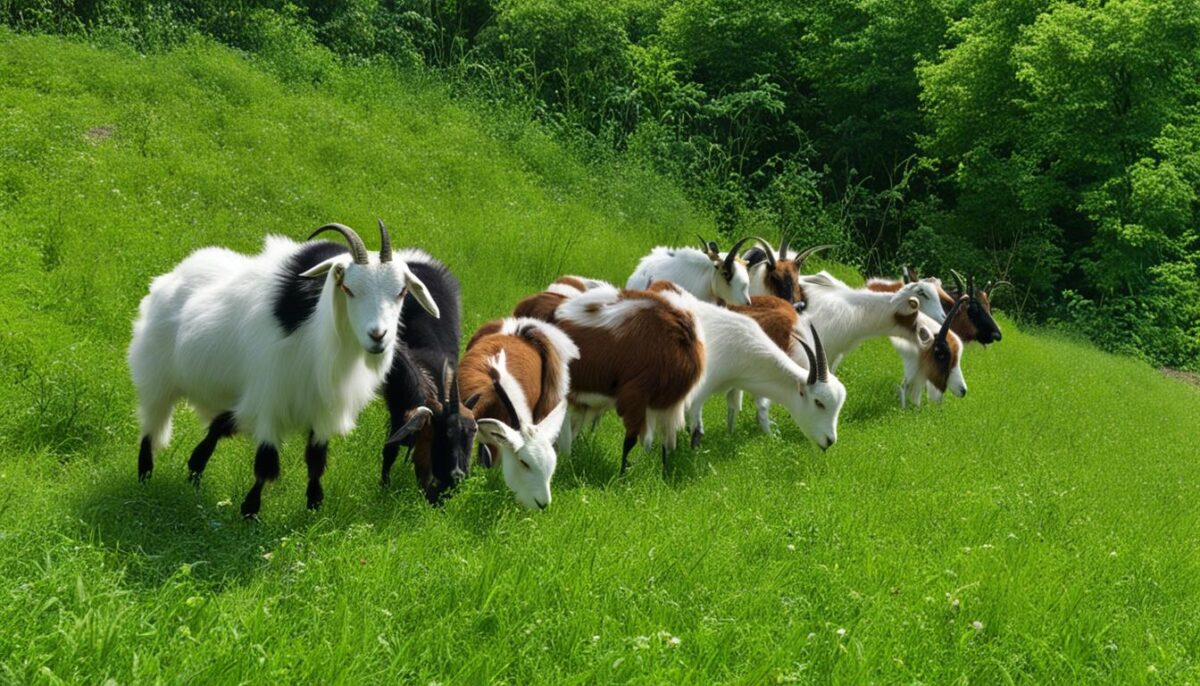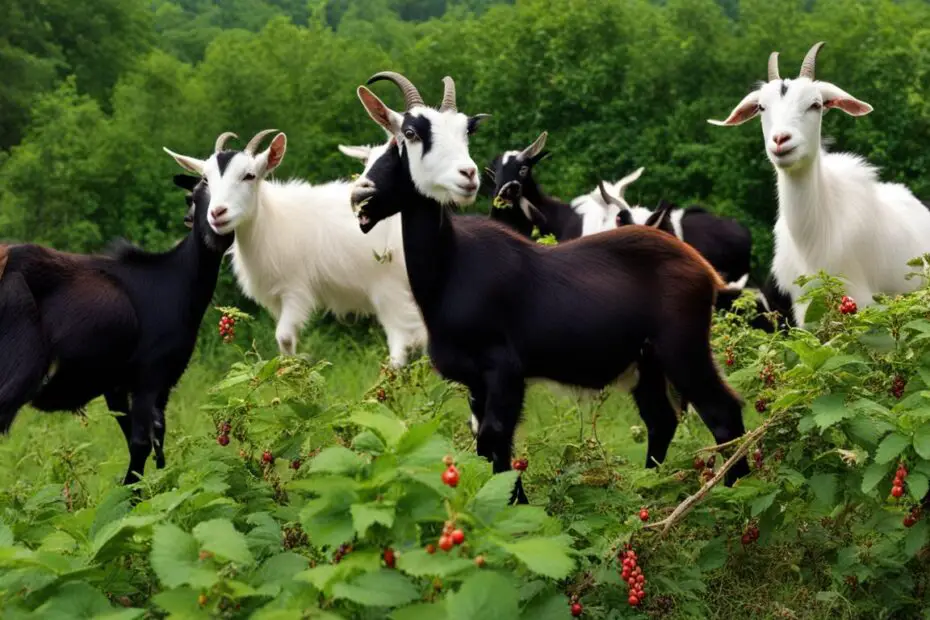Goats have long been admired for their diverse eating habits. Unlike other domesticated ruminants, goats prefer browsing over grazing, and they have a remarkable ability to consume a wide range of plant species. But what about blackberry bushes? Do goats really eat them?
The answer is yes! Goats are natural browsers, and their tough gums and digestive organs allow them to handle roughage like tree bark with ease. This makes blackberry bushes a delectable meal for these curious creatures. In fact, goats have a particular affinity for thorny plants and can happily munch on blackberry bushes without harming themselves.
So, if you’re wondering whether goats eat blackberry bushes, the answer is a resounding yes. But let’s explore their feeding habits and the broader scope of their diet to gain a better understanding of these remarkable animals.
Key Takeaways:
- Goats have diverse eating habits and prefer browsing over grazing.
- They can consume a wide range of plant species, including blackberry bushes.
- Goats’ tough gums and digestive organs enable them to eat thorny plants without harm.
- Blackberry bushes provide nutritional benefits to goats, including vitamins, minerals, and antioxidants.
- Goats’ ability to eat weeds and brush makes them an eco-friendly solution for natural weed control.
The Goats’ Feeding Habits
Understanding the feeding habits of goats is crucial for anyone working with these animals or considering adding them to their farm. Goats have a unique foraging behavior that sets them apart from other domestic ruminants. While they do graze on pastures, they have a preference for browsing, consuming a wider range of plant species. This adaptability allows goats to thrive in different environments, making them a versatile choice for weed control and brush grazing.
When it comes to grazing, goats have their own strategy. They start by grazing along fence lines before venturing into the center of a pasture. They also have a preference for grazing the top of the pasture canopy before gradually moving closer to the soil level. This behavior ensures that goats have access to a variety of forage sources and utilize the available vegetation efficiently.
Furthermore, goats are known for their willingness to travel longer distances in search of preferred forage. They are more likely than other ruminants to explore and cover a wide area, making them effective at finding scarce plant materials. This ability to travel and the versatility in their diet make goats excellent foragers and a valuable asset for weed control and land management.
It’s important to understand the feeding habits of goats to provide them with an appropriate diet and ensure their well-being. By embracing their natural browsing behavior and offering a diverse range of forage options, goat owners can support their animals’ nutritional needs while also harnessing their weed control capabilities.
Goats and Blackberry Bushes
Goats are natural browsers and have a diverse eating pattern that includes thorny plants like blackberry bushes. While other animals may avoid these prickly bushes, goats have tough gums and digestive systems that can handle roughage, allowing them to consume blackberry bushes without harm. In fact, blackberry bushes are a favorite treat for goats.
Goats’ ability to consume thorny plants is due to their unique feeding habits and specialized digestive systems. They have adapted to browse on a wide range of plant species, including weeds, shrubs, grasses, saplings, and even nuisance trees. Blackberry bushes, with their sweet and nutritious leaves and berries, are a particularly enticing meal for goats. They can mouth sharp and thorny objects without hurting themselves, making them excellent brush grazers.
When goats eat blackberry bushes, they not only enjoy a tasty treat but also receive nutritional benefits. Blackberry bushes are a good source of vitamins and minerals, including Vitamin C, and are rich in antioxidants. These antioxidants can boost goats’ immune systems and provide additional health benefits. Furthermore, the tannins present in blackberries have astringent properties that can help with digestive issues like diarrhea.
| Benefits of Goats Eating Blackberry Bushes | Nutritional Value |
|---|---|
| 1. Boosts the immune system | High in Vitamin C |
| 2. Aids in digestion | Contains fiber and tannins |
| 3. Provides antioxidants | Rich in antioxidants |
The Benefits of Goats Eating Blackberry Bushes
Goats derive several benefits from eating blackberry bushes. The nutritional value of blackberry bushes makes them a valuable addition to goats’ diet. These bushes are rich in vitamins and minerals, including Vitamin C. Goats can benefit from the antioxidants present in blackberries, which can boost their immune system. Additionally, blackberries contain fiber, which aids digestion in goats.
| Nutritional Benefits of Blackberry Bushes for Goats |
|---|
| Vitamins and Minerals |
| Fiber |
| Antioxidants |
Furthermore, the tannins found in blackberries have astringent properties that can help with diarrhea and other digestive issues in goats. These tannins act as a natural remedy for gastrointestinal problems, providing goats with relief from discomfort. Overall, the consumption of blackberry bushes by goats not only offers nutritional benefits but also supports their overall digestive health.
Blackberries provide goats with essential vitamins and minerals, antioxidants, and fiber. These benefits enhance goats’ overall health and well-being while also aiding in their digestive processes. The consumption of blackberry bushes can be viewed as a natural and nutritious treat for goats.
It’s interesting to note that goats’ ability to consume blackberry bushes without harming themselves is a testament to their resilient digestive system. Their tough gums and specialized digestive organs enable them to handle roughage like tree bark and thorny plants without issue. Additionally, goats’ browsing behavior makes them well-equipped to forage on a variety of plants, including blackberry bushes.
Goats and Other Weeds
Goats are known for their diverse and adaptable eating habits, and this extends to their preference for consuming a variety of weeds. These resourceful animals have a special affinity for certain types of weeds, which can make them an effective natural solution for weed control.
Types of Weeds Goats Eat
Goats have a penchant for noxious weeds, such as blackberry, scotch broom, and gorse. These thorny plants are often seen as nuisances and can quickly overtake an area if left uncontrolled. However, goats relish the opportunity to feast on these plants, making them a valuable asset in weed management efforts.
In addition to thorny weeds, goats are also attracted to other plants like ivy, lantana, camphor laurel, and fireweed. These plants can be invasive and difficult to remove, but goats can help keep them in check by grazing on them.
| Weeds | Description |
|---|---|
| Blackberry | Thorny plant commonly found in various regions. Goats enjoy consuming the leaves, stems, and berries. |
| Scotch Broom | Woody shrub with yellow flowers. Goats can help control its spread by eating the leaves and stems. |
| Gorse | Spiny shrub with yellow flowers. Goats are attracted to its foliage and can help reduce its growth. |
| Ivy | Vining plant often found climbing on trees and buildings. Goats can graze on the leaves and stems, preventing its spread. |
| Lantana | Flowering plant with colorful blooms. Goats can help control its growth by consuming the leaves and stems. |
| Camphor Laurel | Invasive tree species with aromatic leaves. Goats can browse on the leaves, helping to manage its spread. |
| Fireweed | Wildflower known for its vibrant blooms. Goats can help control its growth by consuming the leaves and stems. |
By utilizing goats to target these specific weeds, landowners can effectively manage and control their growth while providing a natural food source for these adaptable animals.
Grazing Habits of Goats
Goats have unique grazing habits that differentiate them from other domesticated ruminant animals. Unlike traditional grazers, goats prefer rough and steep land rather than flat, smooth terrain. This inclination towards rugged landscapes is due to their natural browsing behavior, as goats are more inclined to climb and reach for tree leaves.
In their quest for preferred forage, goats have been observed standing on their hind legs or throwing their bodies against saplings to bring them within reach. This agile and determined foraging behavior allows goats to access a variety of browse species that other ruminants may overlook. Additionally, goats have a penchant for selecting plant parts containing tannins, further showcasing their selective grazing habits.
While goats can graze on pasture alone, they have a preference for browse species. Their adaptable diet and grazing habits make them suitable for clearing brush and controlling weed infestations. By utilizing their natural browsing instincts, goats can cover a wide area in search of scarce plant materials, proving to be an eco-friendly and cost-effective solution for maintaining landscapes.
| Characteristic | Description |
|---|---|
| Preference | Goats prefer browsing over grazing pastures. |
| Foraging Behavior | Goats graze along fence lines before moving to the center of a pasture. They also graze the top of the pasture canopy before grazing close to the soil level. |
| Tolerance to Roughage | Goats can consume thorny plants like blackberry bushes without causing harm to themselves due to their tough gums and digestive system. |
| Selective Grazing | Goats are more likely to select plant parts containing tannins. |
Grazing habits of goats provide insight into their unique foraging behavior and adaptability to various environments. Their preference for browsing, selective grazing, and ability to navigate challenging terrain make them effective brush grazers and weed control agents.

By leveraging the natural abilities of goats, landowners can harness their grazing habits to maintain landscapes, clear brush, and control weed infestations. Whether it’s rough and steep land or a diverse range of browse species, goats’ grazing habits make them a valuable asset for sustainable land management.
Goats’ Role in Weed Control
Goats are often utilized for brush grazing and weed control due to their natural browsing behavior and diverse diet. They can consume a wide range of vegetation, including thorny plants and woody vegetation, making them highly effective at eliminating unwanted weeds. The use of goats for weed control offers several benefits, including reducing the need for herbicides and chemical treatments, providing an eco-friendly solution, and offering a cost-effective alternative.
Goats are well-equipped to handle stickers and thorny plants, allowing them to graze on areas that are often inaccessible to other weed control methods. Their ability to cover a wide area in search of scarce plant materials also makes them efficient at targeting weeds in various landscapes. Additionally, goat herds can be rented for brush removal, making it a flexible and scalable solution for weed management.
By employing goats for brush grazing, landowners can not only control weed infestations but also promote sustainable land management practices. Goats’ natural browsing behavior helps maintain biodiversity by controlling the spread of invasive plant species. They can selectively graze on certain weeds, creating space for the growth of desirable vegetation. Overall, harnessing the grazing habits of goats for weed control presents a viable and environmentally friendly approach to maintaining landscapes.
Table: Comparison of Goat Grazing and Chemical Weed Control
| Aspect | Goat Grazing | Chemical Weed Control |
|---|---|---|
| Environmental Impact | Reduces the need for herbicides and chemical treatments, minimizing the negative impact on soil, water, and wildlife | Often involves the use of synthetic chemicals that can have harmful effects on the environment |
| Cost | Can be more cost-effective, especially for large areas, as goats can efficiently clear vegetation | May require recurring expenses for purchasing and applying herbicides |
| Biodiversity | Allows for selective grazing, targeting specific weeds while promoting the growth of desirable vegetation | May result in unintended harm to non-target plants, affecting overall biodiversity |
| Flexibility | Offers flexibility in terms of adjusting herd size and grazing duration to meet specific weed control needs | Requires adherence to specific application schedules and weather conditions |
| Long-Term Effects | Can contribute to sustainable land management practices by reducing weed regrowth and promoting natural vegetation | May lead to the development of herbicide-resistant weeds over time, requiring the use of stronger chemicals |
Precautions When Feeding Goats Blackberry Bushes
While goats can safely eat blackberry bushes, it is important to take certain precautions to ensure their well-being. Here are some key considerations when feeding goats blackberry bushes:
- Wash the blackberries: Before feeding blackberry bushes to goats, it is crucial to wash them thoroughly to remove any dirt, debris, or traces of pesticides. This will help prevent goats from ingesting harmful substances and ensure their safety.
- Feed in moderation: Although goats enjoy blackberries, it is essential not to overfeed them. Give goats a small handful of blackberries at a time to prevent stomach upset. Overconsumption can lead to digestive issues, so it is best to provide blackberries as a treat in limited quantities.
- Monitor for allergies or discomfort: After goats eat blackberries, it is important to monitor them closely for any signs of discomfort or allergic reactions. Some goats may be more sensitive to certain foods, so it is crucial to observe their behavior and well-being after consuming blackberry bushes.
Taking these precautions will help ensure the safety and health of your goats when feeding them blackberry bushes. By providing them with this tasty treat in moderation and monitoring their well-being, you can enjoy watching your goats indulge in their natural browsing behavior.
Table: Potential Risks of Feeding Blackberry Bushes to Goats
| Risk | Description |
|---|---|
| Contamination | Blackberries may contain dirt, debris, or traces of pesticides that can be harmful to goats if ingested. |
| Overconsumption | If goats eat too many blackberries, it can lead to digestive issues and stomach upset. |
| Allergic Reactions | Some goats may have allergies or sensitivities to certain foods, including blackberries. Monitoring for any signs of discomfort or allergic reactions is crucial. |

This archaeological evidence further highlights the adaptability and resourcefulness of goats in different environments. It suggests that even thousands of years ago, goats were recognized for their ability to utilize various food sources, including vegetation such as blackberry bushes.
Conclusion
In conclusion, goats have a diverse and adaptable diet, and they can safely eat blackberry bushes as part of their browsing behavior. Blackberry bushes offer nutritional benefits to goats, including vitamins, minerals, and antioxidants that contribute to their overall health. Goats’ ability to consume thorny plants without harm is a testament to their robust digestive system.
Furthermore, goats’ natural inclination to browse on a variety of plants, including blackberry bushes, makes them effective in weed control and brush grazing. Their unique grazing habits and preference for browse species allow them to access hard-to-reach areas, making them an eco-friendly and cost-effective solution for managing vegetation in various environments.
The archaeological evidence from the GumelniÈ›a site highlights the historical importance of goats in agrarian communities. It showcases their role in sustaining human populations through their ability to adapt to different environments and diverse diets. Goats’ compatibility with blackberry bushes further showcases their resilience and resourcefulness as domesticated animals.
FAQ
Do goats eat blackberry bushes?
Yes, goats can safely eat blackberry bushes. They are natural browsers and enjoy eating thorny plants like blackberry bushes.
What other weeds do goats eat?
Goats are known to eat a variety of weeds, including noxious weeds like blackberry, scotch broom, gorse, ivy, lantana, camphor laurel, and fireweed.
Are blackberry bushes nutritious for goats?
Yes, blackberry bushes provide nutritional benefits to goats. They are a good source of vitamins, minerals, and antioxidants that can boost the goats’ immune system.
How do goats graze?
Goats have unique grazing habits. They prefer browsing over grazing and have a preference for browse species. They graze along fence lines before moving to the center of a pasture, and they graze the top of the pasture canopy before grazing close to the soil level.
What is the role of goats in weed control?
Goats are effective at eating weeds and can help eliminate the need for herbicides. They can graze on a wide range of vegetation, including thorny plants and woody vegetation, making them a natural and eco-friendly weed control solution.
Are there any precautions when feeding goats blackberry bushes?
Yes, blackberries should be washed to remove any dirt or pesticides before feeding them to goats. It’s important not to overfeed and only give goats a small handful at a time to prevent stomach upset. Monitor goats for any signs of discomfort or allergic reactions after eating blackberries.
What other berries can goats eat?
Goats can safely eat strawberries and blueberries. Strawberries are packed with vitamins and minerals, while blueberries are rich in antioxidants.
What is the archaeological evidence of goat diet?
The GumelniÈ›a site in Romania provides archaeological evidence of the diet and lifeways of Chalcolithic people. The site’s investigation reveals that the inhabitants had a diet based on crops and natural resources, including fish, freshwater molluscs, game, and heavily manured crops.


